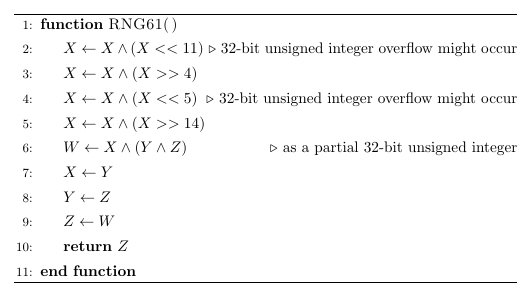传送门
题面:
Glad You Came
Time Limit: 10000/5000 MS (Java/Others) Memory Limit: 262144/262144 K (Java/Others)
Total Submission(s): 829 Accepted Submission(s): 299
Problem Description
Steve has an integer array a of length n (1-based). He assigned all the elements as zero at the beginning. After that, he made m operations, each of which is to update an interval of a with some value. You need to figure out ⨁ni=1(i⋅ai) after all his operations are finished, where ⨁ means the bitwise exclusive-OR operator.
In order to avoid huge input data, these operations are encrypted through some particular approach.
There are three unsigned 32-bit integers X,Y and Z which have initial values given by the input. A random number generator function is described as following, where ∧ means the bitwise exclusive-OR operator, << means the bitwise left shift operator and >> means the bitwise right shift operator. Note that function would change the values of X,Y and Z after calling.

Let the i-th result value of calling the above function as fi (i=1,2,⋯,3m). The i-th operation of Steve is to update aj as vi if aj<vi (j=li,li+1,⋯,ri), where
⎧⎩⎨⎪⎪lirivi=min((f3i−2modn)+1,(f3i−1modn)+1)=max((f3i−2modn)+1,(f3i−1modn)+1)=f3imod230(i=1,2,⋯,m).
Input
The first line contains one integer T, indicating the number of test cases.
Each of the following T lines describes a test case and contains five space-separated integers n,m,X,Y and Z.
1≤T≤100, 1≤n≤105, 1≤m≤5⋅106, 0≤X,Y,Z<230.
It is guaranteed that the sum of n in all the test cases does not exceed 106 and the sum of m in all the test cases does not exceed 5⋅107.
Output
For each test case, output the answer in one line.
Sample Input
4 1 10 100 1000 10000 10 100 1000 10000 100000 100 1000 10000 100000 1000000 1000 10000 100000 1000000 10000000
Sample Output
1031463378 1446334207 351511856 47320301347
Hint
In the first sample, a = [1031463378] after all the operations. In the second sample, a = [1036205629, 1064909195, 1044643689, 1062944339, 1062944339, 1062944339, 1062944339, 1057472915, 1057472915, 1030626924] after all the operations.
题目描述:
给你一个长度为n的最开始为0的数以及m个更新操作以及数据生成器参数X,Y,Z。每次操作,将由数据生成器生成出li,ri,vi。让你从区间[li,ri]中,将所有小于vi的数变为vi。最后让你求从1到n的 i*ai的亦或和。
题目分析:
对于这个题,我们需要发现,倘若在某个区间[l,r]中,如果这个区间中的最小的数都大于v,那么我们就不需要对这个区间进行任何操作(因为在这段区间一定不用进行操作);而倘若在这个区间中的最大值都小于v,那么证明整个区间的值全都要改变成v。因此,我们考虑用线段树对区间内的最大值以及最小值同时进行维护。
倘若我们发现一个区间[l,r]的Amax<v,则我们用一个lazy标记标记,使得整个区间的最大值以及最小值同时更新为v,而倘若我们发现一个区间内的Amin>v,则我们直接return掉这个结果。而当我们经过到叶子结点的时候,则我们将叶子结点的最大值和最小值分别更新为。Amax=max(Amax,v),Amin=max(Amin,v)。
最后我们只需要暴力的获取每一位的置即可。
#include <bits/stdc++.h>
#define maxn 100005
using namespace std;
typedef long long ll;
ll a[maxn];
int n,m;
ll ans=0;
struct Tree{
int minn,maxx;
int lz;
}tr[maxn<<2];
unsigned int X,Y,Z;
unsigned int functions(){
X=X^(X<<11);
X=X^(X>>4);
X=X^(X<<5);
X=X^(X>>14);
unsigned int w=X^(Y^Z);
X=Y;
Y=Z;
Z=w;
return Z;
}
void push_up(int rt){
tr[rt].maxx=max(tr[rt<<1].maxx,tr[rt<<1|1].maxx);
tr[rt].minn=min(tr[rt<<1].minn,tr[rt<<1|1].minn);
}
void build(int l,int r,int rt){
tr[rt].lz=-1;
if(l==r){
//tr[rt].sum=0;
tr[rt].maxx=0;
tr[rt].minn=0;
return;
}
int mid=(l+r)>>1;
build(l,mid,rt<<1);
build(mid+1,r,rt<<1|1);
push_up(rt);
}
void push_down(int rt){
if(tr[rt].lz!=-1){
tr[rt<<1].maxx=max(tr[rt].lz,tr[rt<<1].maxx);
tr[rt<<1|1].maxx=max(tr[rt].lz,tr[rt<<1|1].maxx);
tr[rt<<1].minn=max(tr[rt].lz,tr[rt<<1].minn);
tr[rt<<1|1].minn=max(tr[rt].lz,tr[rt<<1|1].minn);
tr[rt<<1].lz=max(tr[rt].lz,tr[rt<<1].lz);
tr[rt<<1|1].lz=max(tr[rt].lz,tr[rt<<1|1].lz);
tr[rt].lz=-1;
}
}
void update(int L,int R,int l,int r,int rt,int v){
if(l==r){//到达叶子节点
tr[rt].minn=max(v,tr[rt].minn);
tr[rt].maxx=max(v,tr[rt].maxx);
return ;
}
if(L<=l&&R>=r){
if(tr[rt].maxx<=v){//如果最大值还比v小,则更新整段区间
tr[rt].maxx=v;
tr[rt].minn=v;
tr[rt].lz=max(tr[rt].lz,v);
return;
}
if(tr[rt].minn>=v) return;
}
if(tr[rt].minn>=v) return;
push_down(rt);
int mid=(l+r)>>1;
if(L<=mid) update(L,R,l,mid,rt<<1,v);
if(R>mid) update(L,R,mid+1,r,rt<<1|1,v);
push_up(rt);
}
int sum(int l,int r,int rt,int pos){//暴力求值
if (l==r){
return tr[rt].minn;
}
int mid=(l+r)>>1;
push_down(rt);
if(pos<=mid) return sum(l,mid,rt<<1,pos);
else return sum(mid+1,r,rt<<1|1,pos);
}
int main()
{
int t;
scanf("%d",&t);
while(t--){
ans=0;
scanf("%d%d%u%u%u",&n,&m,&X,&Y,&Z);
build(1,n,1);
for(int i=1;i<=m;i++){
int l=functions()%n+1;
int r=functions()%n+1;
int v=functions()%(1<<30);
if(l>r) swap(l,r);
update(l,r,1,n,1,v);
}
for(int i=1;i<=n;i++){
ans^=1ll*i*sum(1,n,1,i);
}
printf("%lld\n",ans);
}
return 0;
}